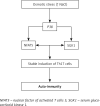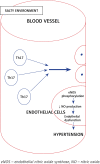High dietary salt intake activates inflammatory cascades via Th17 immune cells: impact on health and diseases
- PMID: 35316907
- PMCID: PMC8924833
- DOI: 10.5114/aoms.2020.96344
High dietary salt intake activates inflammatory cascades via Th17 immune cells: impact on health and diseases
Abstract
The incidence of immune-mediated inflammatory diseases (IMIDs) is on the rise. A high salt content in the diet was found to play a crucial role in mediating IMIDs. It was demonstrated that increased salt concentration favors the differentiation of CD4+ cells to pathogenic Th17 cells, which predispose to several inflammatory diseases by modulating the immunological milieu. In auto-immune diseases increased salt concentration causes stable induction of Th17 cells. In cancer, increased salt concentration triggers chronic inflammation and increases vascular endothelial growth factor levels. Salt-mediated proliferation of Th17 cells has been found to reduce nitric oxide production in the endothelial cells, leading to hypertension. Increased salt concentration was found to alter the intestinal flora, which favors local inflammation. This review attempts to explain the role of high salt concentration and its molecular pathways in causing IMIDs.
Keywords: Th17 cells; cancer; immunity; inflammation; sodium chloride.
Copyright: © 2020 Termedia & Banach.
Conflict of interest statement
The authors declare no conflict of interest.
Figures




References
-
- Appel LJ. Reducing sodium intake to prevent stroke: time for action, not hesitation. Stroke. 2014;45:909–11. - PubMed
-
- Sugiura T, Takase H, Ohte N, Dohi Y. Dietary salt intake is a significant determinant of impaired kidney function in the general population. Kidney Blood Press Res. 2018;43:1245–54. - PubMed
-
- Strnad M. Salt and cancer. Acta Medica Croat Cas Hravatske Akad Med Znan. 2010;64:159–61. - PubMed
LinkOut - more resources
Full Text Sources
Research Materials
